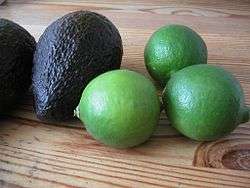Definify.com
Webster 1913 Edition
Lime
Lime
,That foolish birds are caught with.
Lime
,With open eyes, and we must take the chance.
Webster 1828 Edition
Lime
LIME
,LIME
, v.t.Definition 2026
lime
lime
English
Noun
lime (countable and uncountable, plural limes)
- (chemistry) A general term for inorganic materials containing calcium, usually calcium oxide or calcium hydroxide; quicklime.
- 1952, L.F. Salzman, Building in England, page 149.
- Lime, which is the product of the burning of chalk or limestone, might be bought ready burnt, or it could be burnt in kilns specially constructed in the neighbourhood of the building operations.
- 1952, L.F. Salzman, Building in England, page 149.
- (poetic) Any gluey or adhesive substance; something which traps or captures someone; sometimes a synonym for birdlime.
- 1610, The Tempest, by William Shakespeare, act 4 scene 1
- Monster, come, put some lime upon your fingers, and away with the rest.
- (Can we date this quote?) Wordsworth
- Like the lime that foolish birds are caught with.
- 1610, The Tempest, by William Shakespeare, act 4 scene 1
Derived terms
|
|
|
Translations
|
See also
Verb
lime (third-person singular simple present limes, present participle liming, simple past and past participle limed)
- (transitive) To treat with calcium hydroxide or calcium oxide (lime).
- (transitive) To smear with birdlime.
- (rare) To ensnare, catch, entrap.
- 1599, William Shakespeare, Much Ado About Nothing, Act 3 Scene 1
- URSULA. She's lim'd, I warrant you: we have caught her, madam.
- HERO. If it prove so, then loving goes by haps:
- Some Cupid kills with arrows, some with traps.
- 1599, William Shakespeare, Much Ado About Nothing, Act 3 Scene 1
- (rare) To ensnare, catch, entrap.
- (transitive) To apply limewash
Translations
|
|
Etymology 2

An alteration of line, a variant form of lind.
Noun
lime (plural limes)
- A deciduous tree of the genus Tilia, especially Tilia × europaea; the linden tree, or its wood.
- 1871–72, George Eliot, Middlemarch, Chapter 3
- she looked before her, not consciously seeing, but absorbing into the intensity of her mood, the solemn glory of the afternoon with its long swathes of light between the far-off rows of limes, whose shadows touched each other.
- 1871–72, George Eliot, Middlemarch, Chapter 3
Related terms
Usage notes
- Both this and the citrus are trees with fragrant flowers, but this is more temperate and the citrus is more tropical and subtropical. Outside of Europe and adjoining parts of Asia, the citrus sense is much more common
Translations
Etymology 3

From French lime, from Spanish lima, from Arabic لِيمَة (līma), from Persian līmū.
Noun
lime (plural limes)
- Any of several green citrus fruit, somewhat smaller and sharper-tasting than a lemon.
- Any of the trees that bear limes, especially key lime, Citrus aurantiifolia.
- A light, somewhat yellowish, green colour associated with the fruits of a lime tree.
-
lime colour: -
web lime colour:
-
Usage notes
Both this and the linden are trees with fragrant flowers, but the linden is more temperate and this is more tropical and subtropical. Outside of Europe and adjoining parts of Asia, this sense is much more common.
Derived terms
|
|
|
Translations
|
|
|
|
See also
| Colors in English · colors, colours (layout · text) | ||||
|---|---|---|---|---|
| red | green | yellow | cream | white |
| crimson | magenta | teal | lime | pink |
| indigo | blue | orange | gray, grey | violet |
| black | purple | brown | azure, sky blue | cyan |
Adjective
lime (not comparable)
- Containing lime or lime juice.
- Having the aroma or flavor of lime.
- Lime-green.
Translations
Etymology 4
Back-formation from limer.
Verb
lime (third-person singular simple present limes, present participle liming, simple past and past participle limed)
- (West Indies) To hang out/socialize in an informal, relaxed environment, especially with friends, for example at a party or on the beach.
Etymology 5
From lime (the fruit) as comparable to lemon (a more explicit rating in anime).
Noun
lime (plural limes)
- (anime) A fan fiction story that stops short of full, explicit descriptions of sexual activity, with the intimacy left to the reader's imagination.
Anagrams
Danish
Noun
lime c (singular definite limen, plural indefinite lime or limes)
- lime (fruit)
Inflection
Verb
lime (imperative lim, infinitive at lime, present tense limer, past tense limede, perfect tense har limet)
- to glue
Finnish
Pronunciation
- IPA(key): /ˈlime/
- Hyphenation: li‧me
Noun
lime
- lime (citrus tree and its fruit)
Declension
| Inflection of lime (Kotus type 8/nalle, no gradation) | |||
|---|---|---|---|
| nominative | lime | limet | |
| genitive | limen | limejen | |
| partitive | limeä | limejä | |
| illative | limeen | limeihin | |
| singular | plural | ||
| nominative | lime | limet | |
| accusative | nom. | lime | limet |
| gen. | limen | ||
| genitive | limen | limejen limeinrare |
|
| partitive | limeä | limejä | |
| inessive | limessä | limeissä | |
| elative | limestä | limeistä | |
| illative | limeen | limeihin | |
| adessive | limellä | limeillä | |
| ablative | limeltä | limeiltä | |
| allative | limelle | limeille | |
| essive | limenä | limeinä | |
| translative | limeksi | limeiksi | |
| instructive | — | limein | |
| abessive | limettä | limeittä | |
| comitative | — | limeineen | |
Usage notes
This word is now more common than limetti but still regarded as less correct by, for example, the Kielitoimiston sanakirja. Some inflected forms are indeed quite awkward to use.
Synonyms
French
Pronunciation
- IPA(key): /lim/
Etymology 1
Noun
lime f (plural limes)
- file (tool)
Derived terms
- lime à ongles
- limer
Etymology 2
From Spanish lima, from Arabic لِيمَة (līma).
Noun
lime f (plural limes)
- lime (fruit, tree)
Synonyms
- (fruit): limette
Anagrams
Galician
Verb
lime
- first-person singular present subjunctive of limar
- third-person singular present subjunctive of limar
Italian
Etymology 1
Noun
lime f pl
- plural of lima
Etymology 2
Borrowing from English.
Noun
lime m (invariable)
- lime (citrus tree)
Anagrams
Norwegian Bokmål
Etymology 1
From Persian, via Arabic, Spanish lima, and English lime
Noun
lime m (definite singular limen, indefinite plural limer, definite plural limene)
- a lime (citrus fruit)
Etymology 2
Verb
lime (imperative lim, present tense limer, passive limes, simple past lima or limet or limte, past participle lima or limet or limt, present participle limende)
Related terms
- lim (noun)
References
- “lime” in The Bokmål Dictionary.
Norwegian Nynorsk
Etymology
From Persian, via Arabic, Spanish, and English lime
Noun
lime m (definite singular limen, indefinite plural limar, definite plural limane)
- a lime (citrus fruit)
Synonyms
- limett
References
- “lime” in The Nynorsk Dictionary.
Portuguese
Verb
lime
- first-person singular (eu) present subjunctive of limar
- third-person singular (ele and ela, also used with você and others) present subjunctive of limar
- third-person singular (você) affirmative imperative of limar
- third-person singular (você) negative imperative of limar
Spanish
Verb
lime